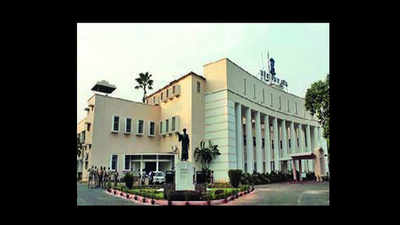- News
- City News
- bhubaneswar News
- Vidhan Parishad resolution likely in monsoon session
Trending
This story is from July 19, 2018
Vidhan Parishad resolution likely in monsoon session

The government has sent delegtaion to Bihar and Telangana to study the process for formation of an upper house to the assembly
BHUBANESWAR: The state government is likely to move a resolution in the forthcoming monsoon session of the assembly to set the ball in motion for the formation of the legislative council or Vidhan Parishad.
Informing this here on Wednesday, commerce and transport minister Nrusingha Charan Sahu, who recently led a delegation to Bihar and Telangana to examine the formation and style of functioning of the Vidhan Parishads there, said he would soon submit a report to chief minister Naveen Patnaik on the issue.
In Telangana, the legislative council was formed after the assembly passed a resolution, Sahu told reporters, adding that a similar resolution may be tabled in the Odisha assembly in the forthcoming monsoon session, dates for which is yet to be notified.
The committee was constituted in January 2015 comprising members of all three major political parties. While BJD legislators -Pramilla Mallik and Manohar Randhari - accompanied Sahu to Bihar and Telangana, Congress legislator Manohar Randhari and BJP's Nitish Gangadeb had expressed their unwillingness to visit the two states.
Article 169 of the Constitution lays provision for creation or abolition of legislative councils in the state. Besides the above four states (to which the team has already visited), Uttar Pradesh, Jammu and Kashmir and Andhra Pradesh too have Vidhan Parishads.
Though the committee is not sure about the financial burden it would leave on the state exchequer, the size of the upper house in Odisha, if constituted, would be around one-third of the state assembly. Given that the assembly has 147 members, Sahu said the legislative council could have around 49 members.
Sources in the state parliamentary affairs department said one-third members (16) of the legislative council will be elected by the MLAs while another one-third will be elected by the zilla parishads and urban local bodies. Similarly, one-twelfth members (4) will be selected from graduates while another one-twelfth member will be selected from among teachers, doctors and former bureaucrats. The governor will select nine eminent persons from various fields.
While constitutional experts welcomed the move of having a legislative council, Congress alleged it is being done to keep disgruntled leaders happy. State Congress president Niranjan Patnaik said the process has been accelerated as elections are less than a year away.
BJP spokesperson Sajjan Sharma questioned why the state government did not take steps to constitute the legislative council when the proposal was mooted in 2015.
Informing this here on Wednesday, commerce and transport minister Nrusingha Charan Sahu, who recently led a delegation to Bihar and Telangana to examine the formation and style of functioning of the Vidhan Parishads there, said he would soon submit a report to chief minister Naveen Patnaik on the issue.
In Telangana, the legislative council was formed after the assembly passed a resolution, Sahu told reporters, adding that a similar resolution may be tabled in the Odisha assembly in the forthcoming monsoon session, dates for which is yet to be notified.
The committee was constituted in January 2015 comprising members of all three major political parties. While BJD legislators -Pramilla Mallik and Manohar Randhari - accompanied Sahu to Bihar and Telangana, Congress legislator Manohar Randhari and BJP's Nitish Gangadeb had expressed their unwillingness to visit the two states.
The committee had earlier visited Karnataka and Maharashtra in 2015, which also have bicameral legislatures.
Article 169 of the Constitution lays provision for creation or abolition of legislative councils in the state. Besides the above four states (to which the team has already visited), Uttar Pradesh, Jammu and Kashmir and Andhra Pradesh too have Vidhan Parishads.
Though the committee is not sure about the financial burden it would leave on the state exchequer, the size of the upper house in Odisha, if constituted, would be around one-third of the state assembly. Given that the assembly has 147 members, Sahu said the legislative council could have around 49 members.
Sources in the state parliamentary affairs department said one-third members (16) of the legislative council will be elected by the MLAs while another one-third will be elected by the zilla parishads and urban local bodies. Similarly, one-twelfth members (4) will be selected from graduates while another one-twelfth member will be selected from among teachers, doctors and former bureaucrats. The governor will select nine eminent persons from various fields.
While constitutional experts welcomed the move of having a legislative council, Congress alleged it is being done to keep disgruntled leaders happy. State Congress president Niranjan Patnaik said the process has been accelerated as elections are less than a year away.
BJP spokesperson Sajjan Sharma questioned why the state government did not take steps to constitute the legislative council when the proposal was mooted in 2015.
End of Article
FOLLOW US ON SOCIAL MEDIA










